Socialization Culture • Norms : social

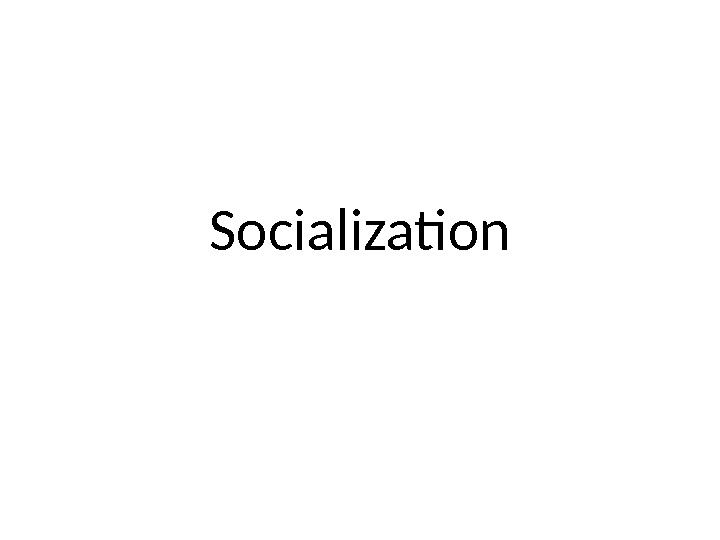
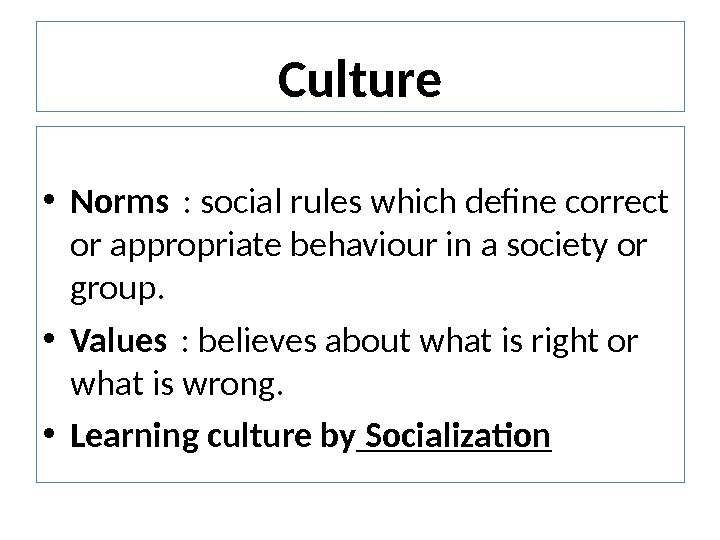
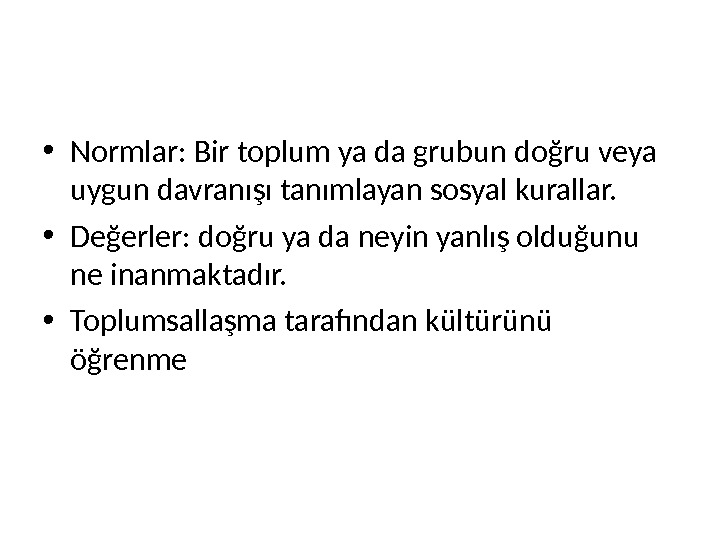
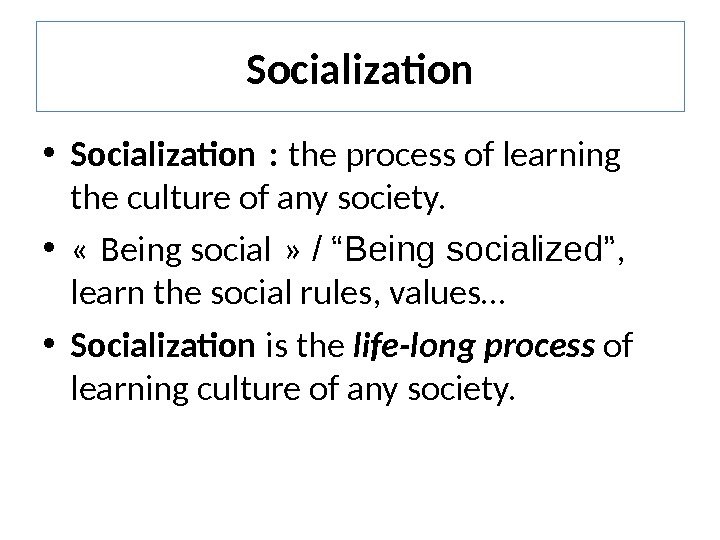
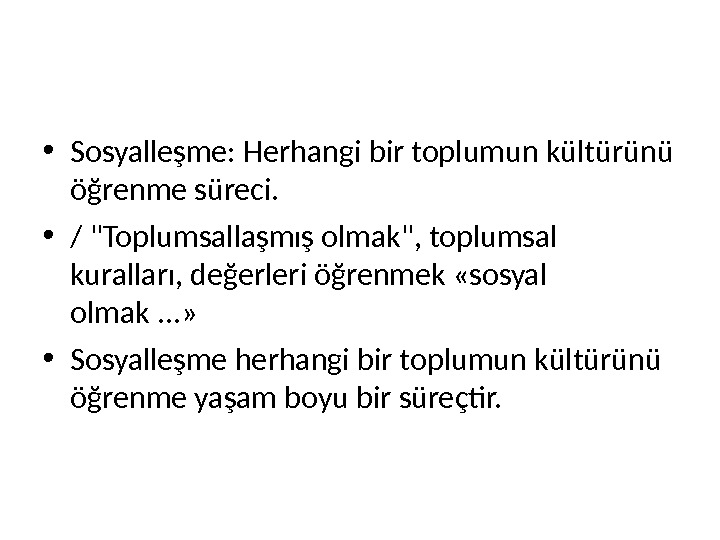
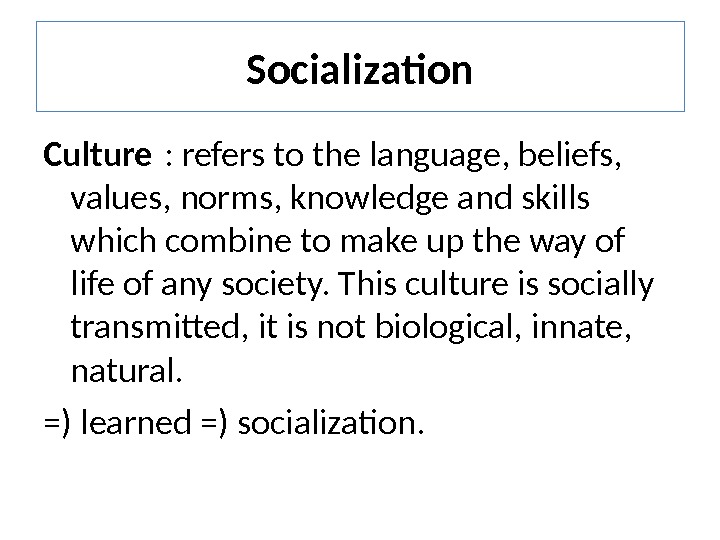
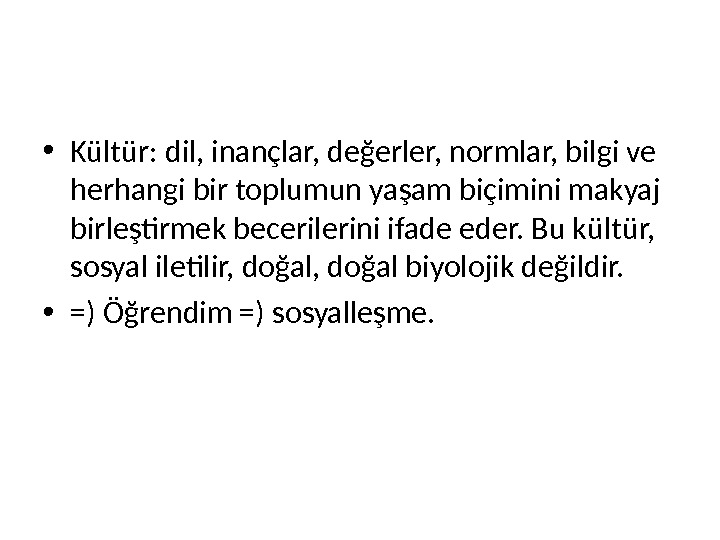
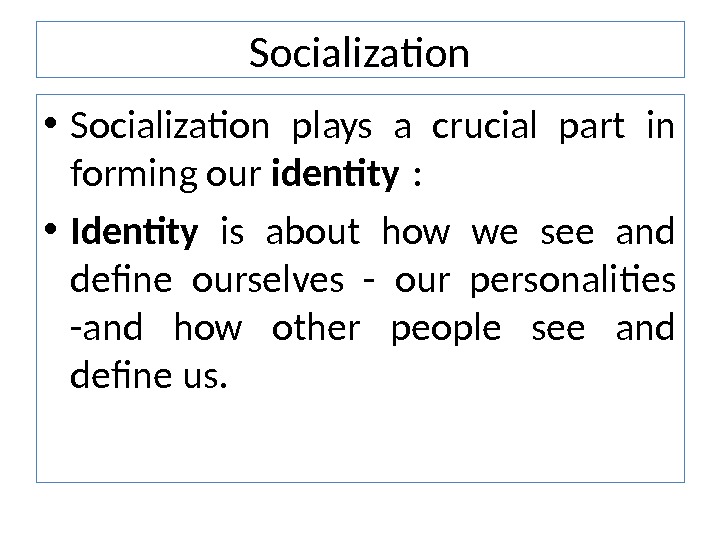
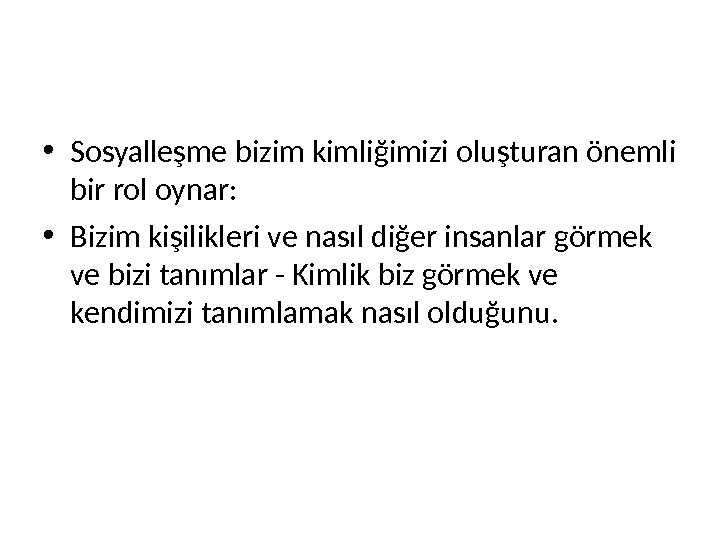
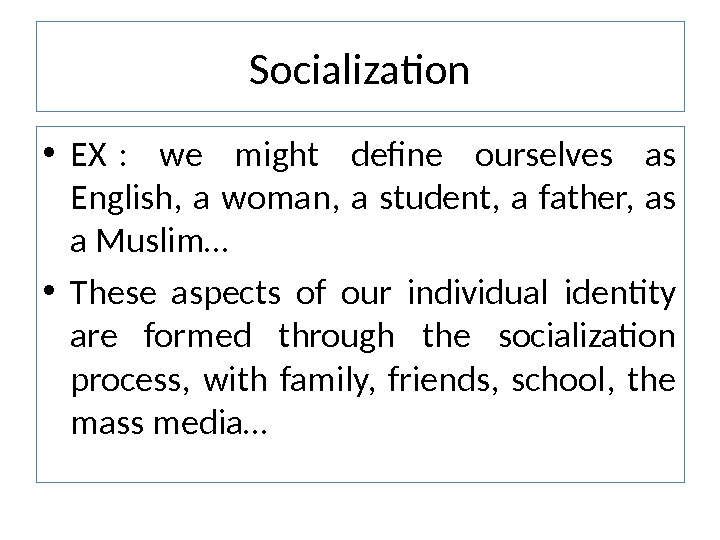
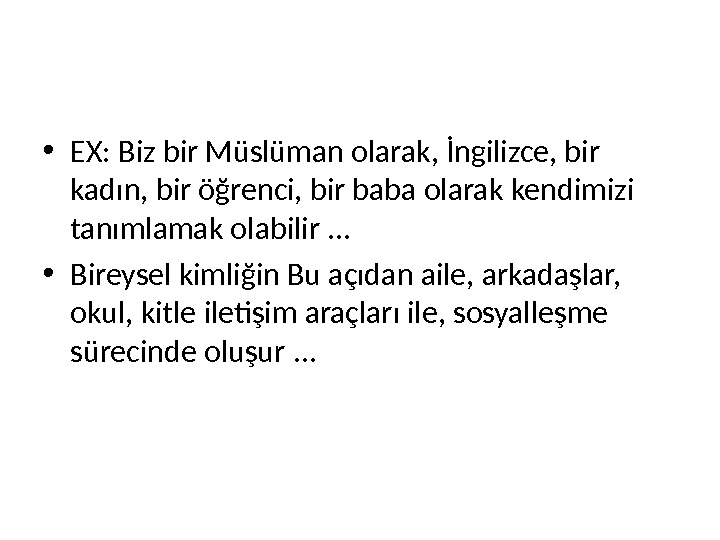
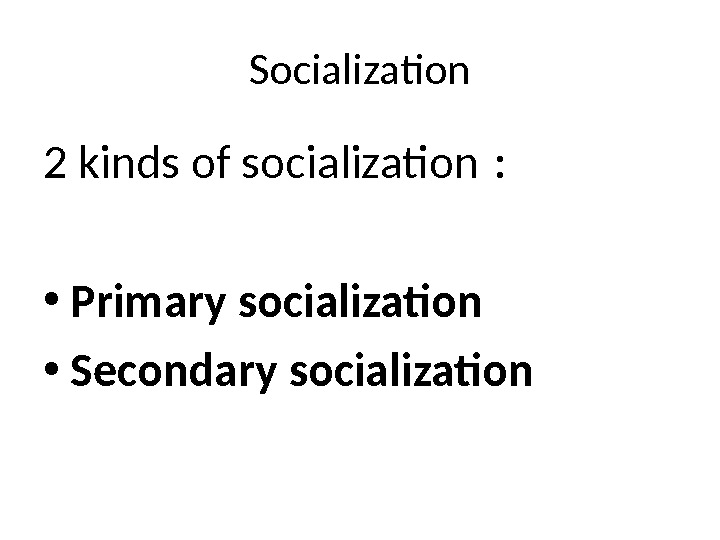
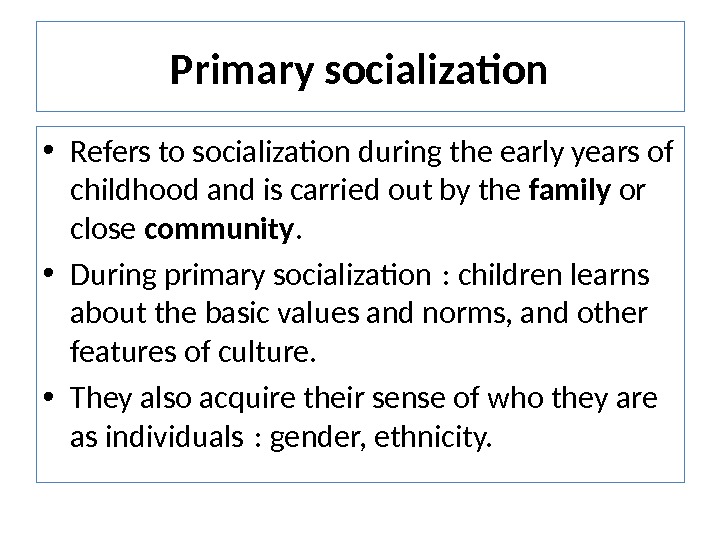
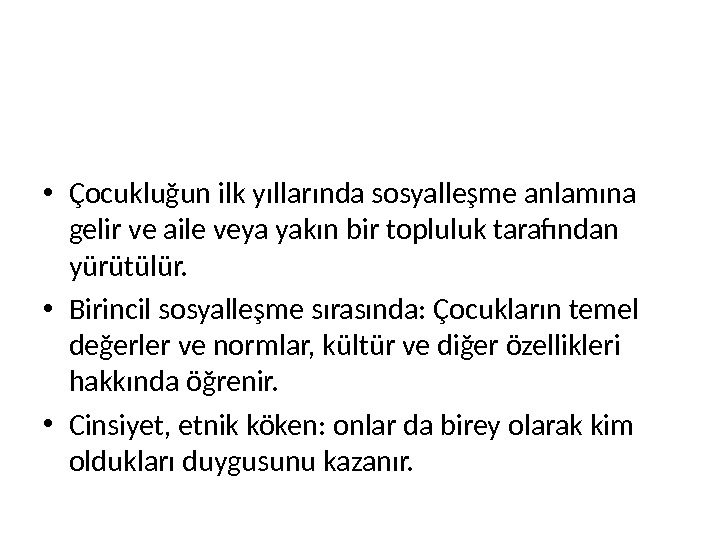
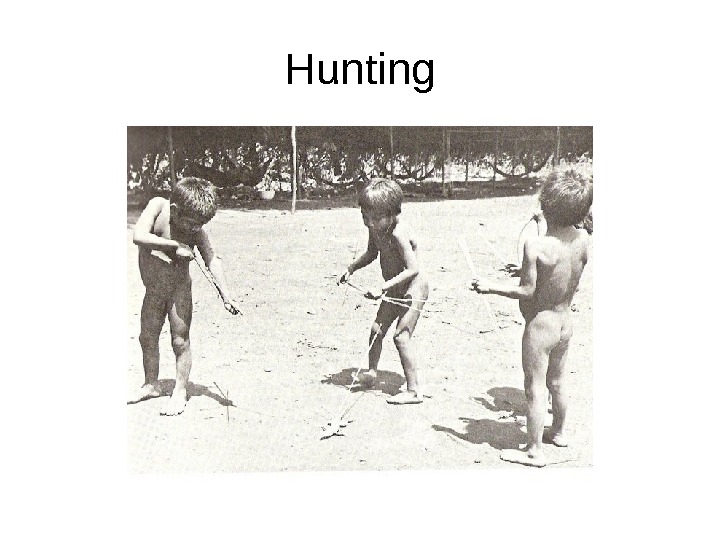
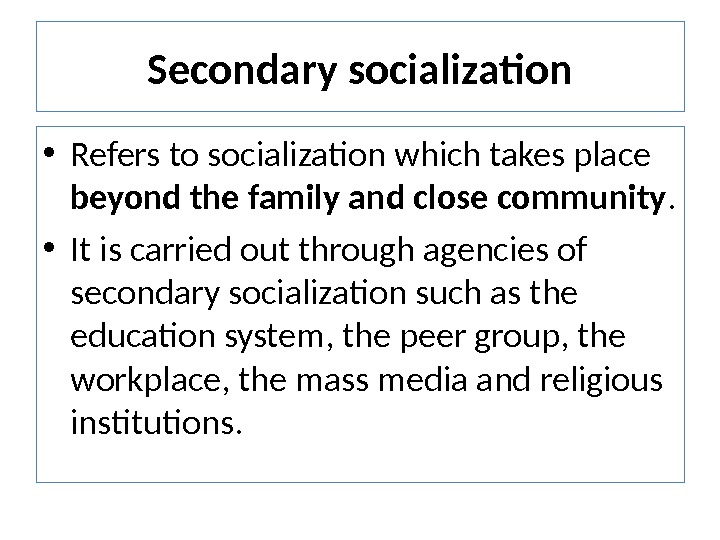
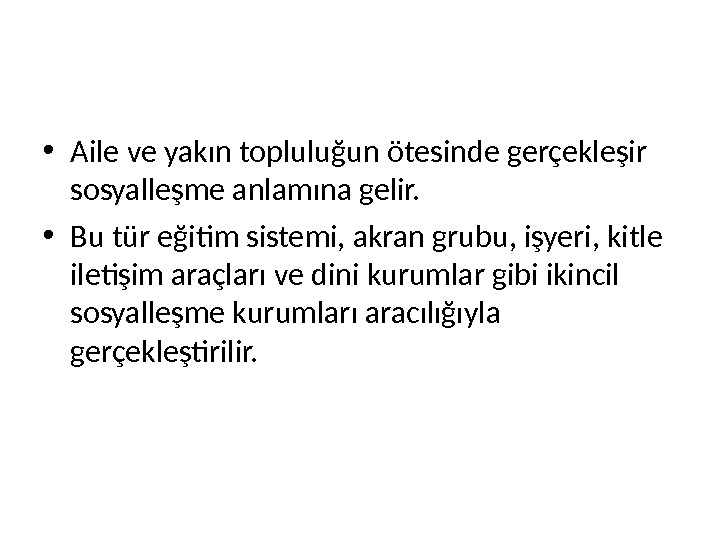
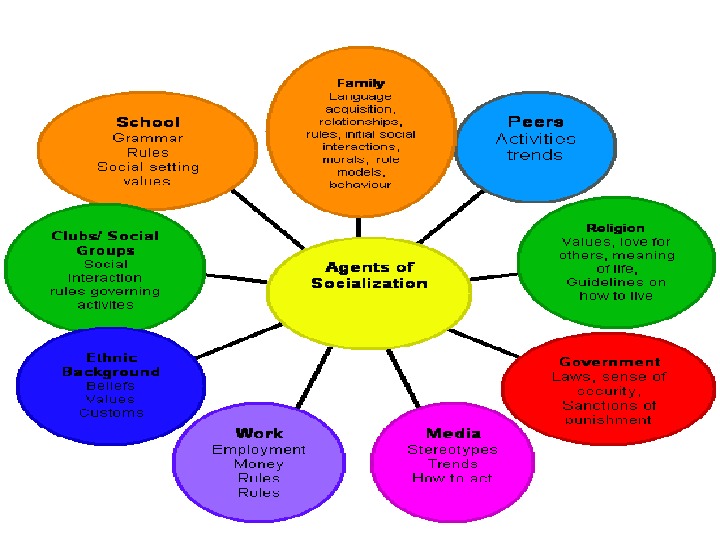
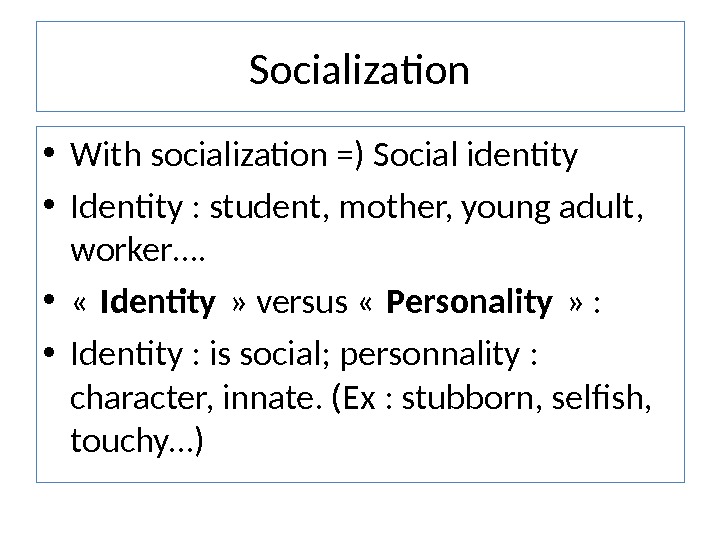
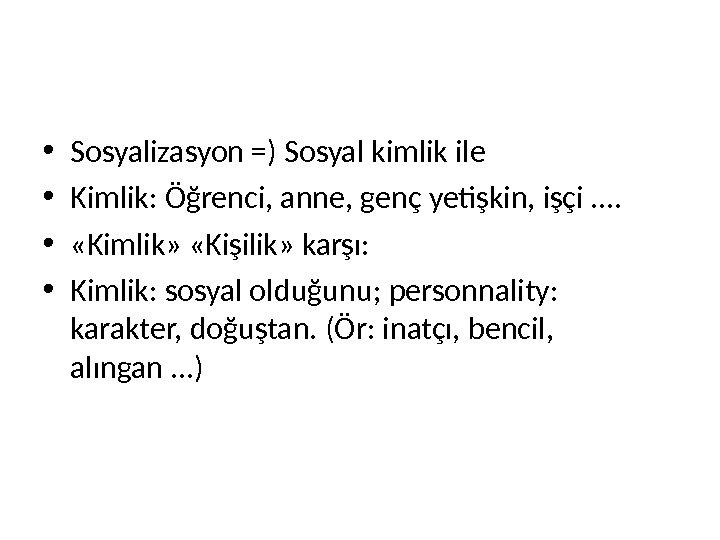
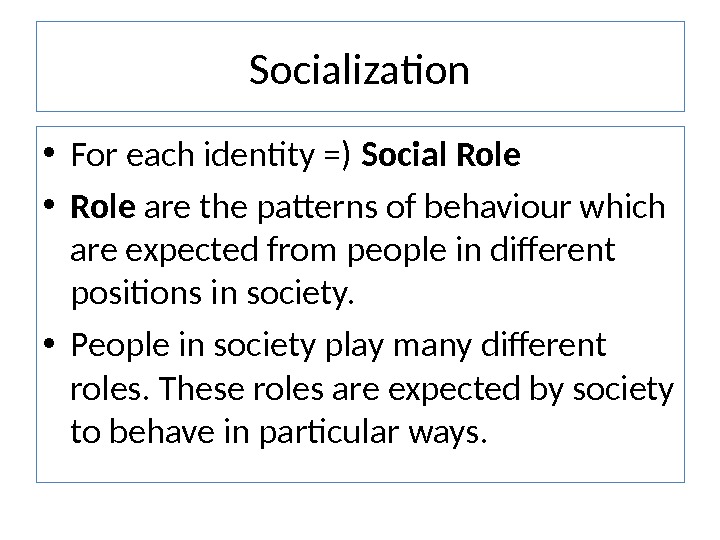
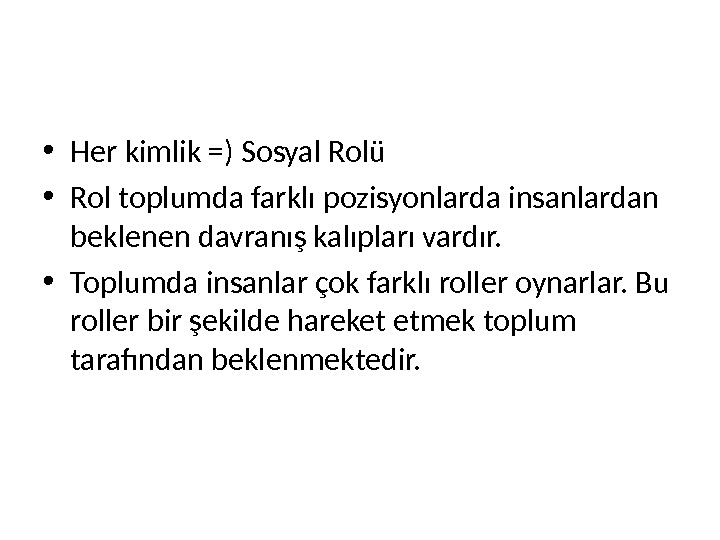
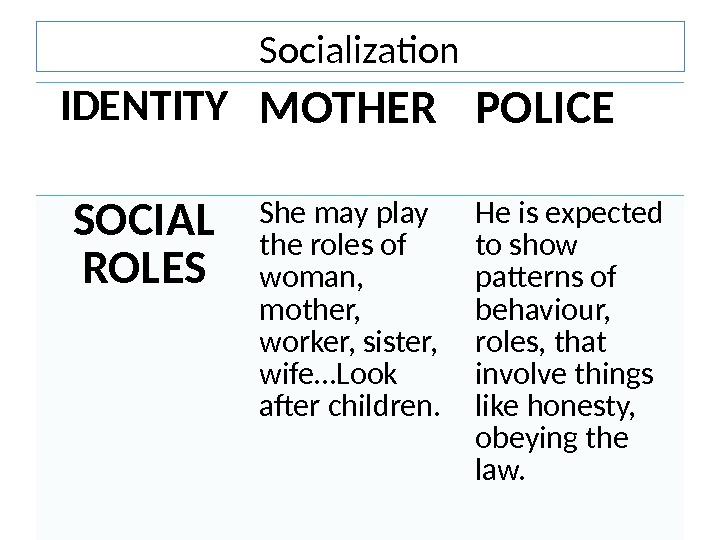
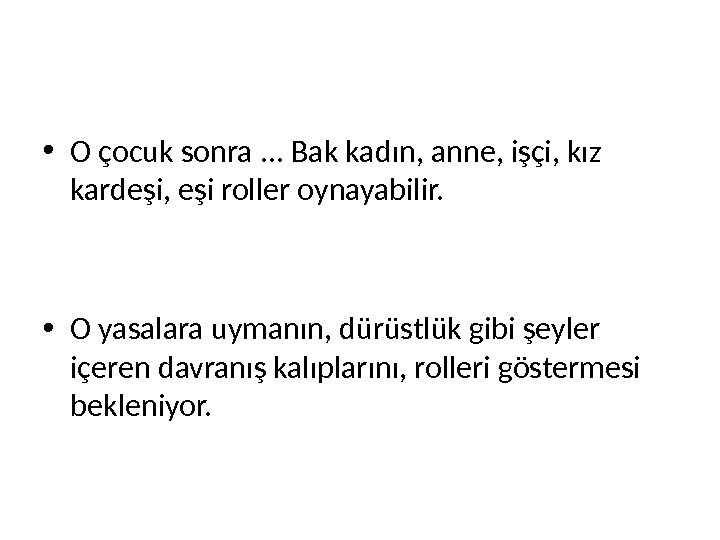
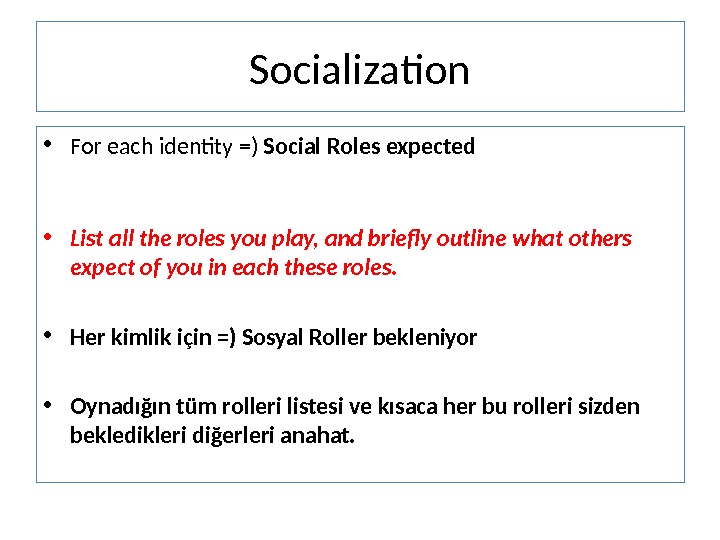
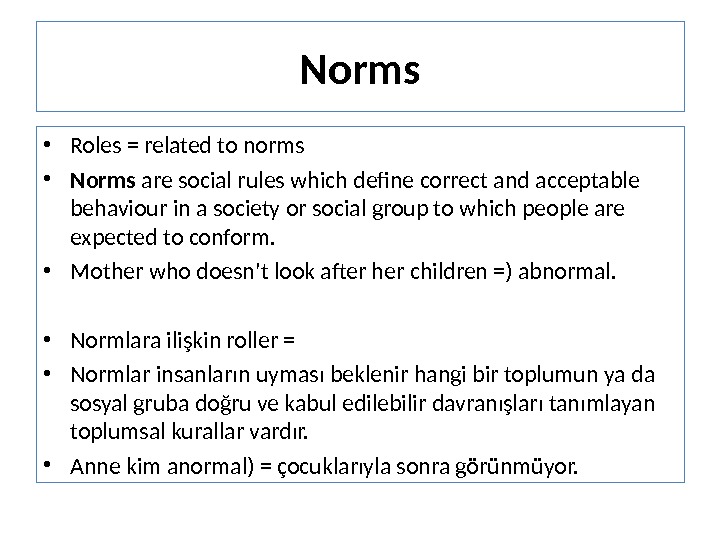
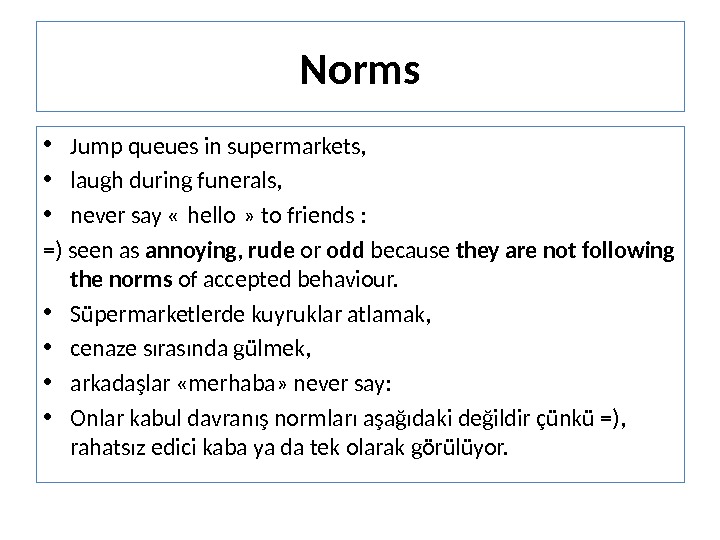
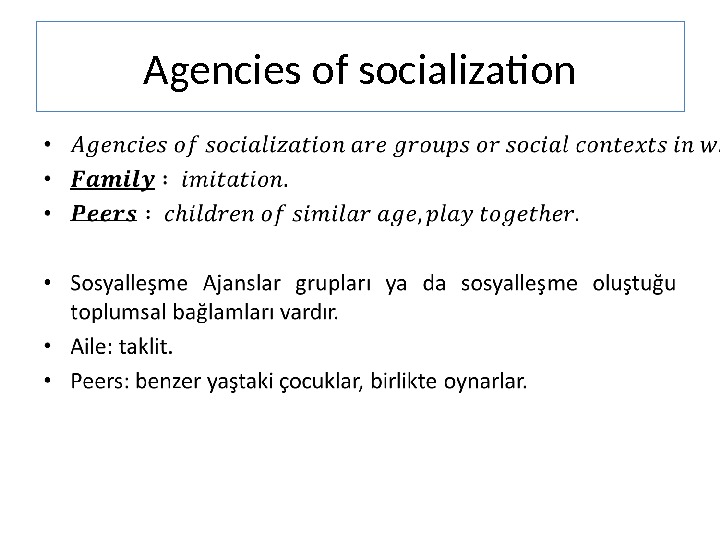
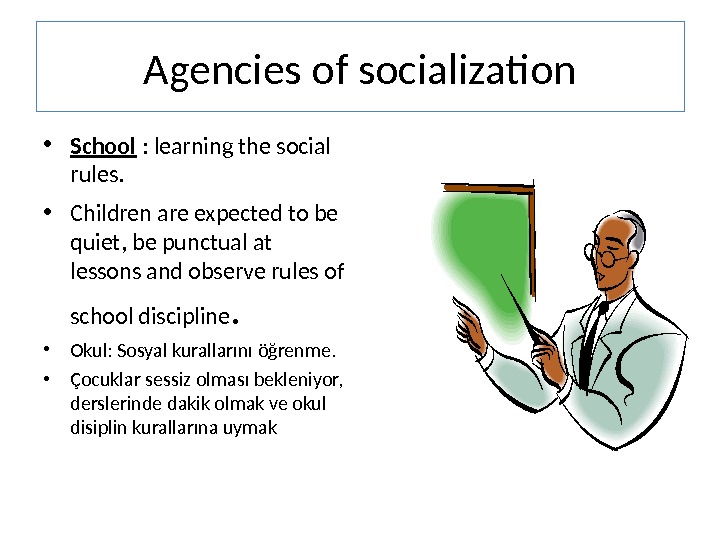
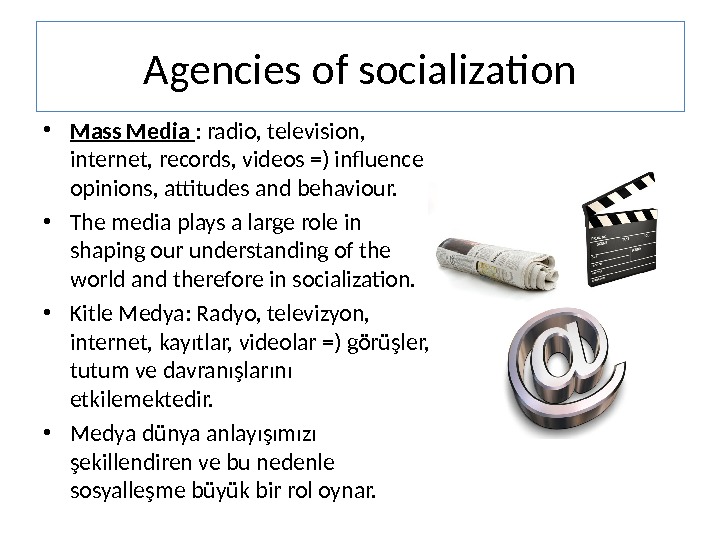
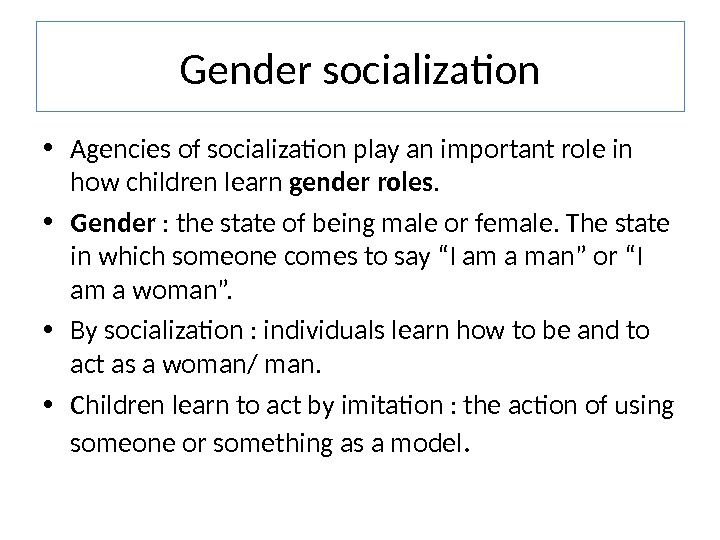
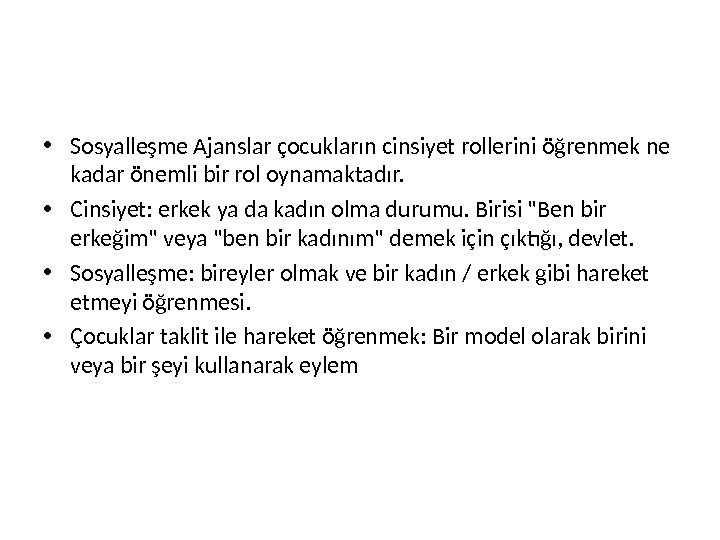
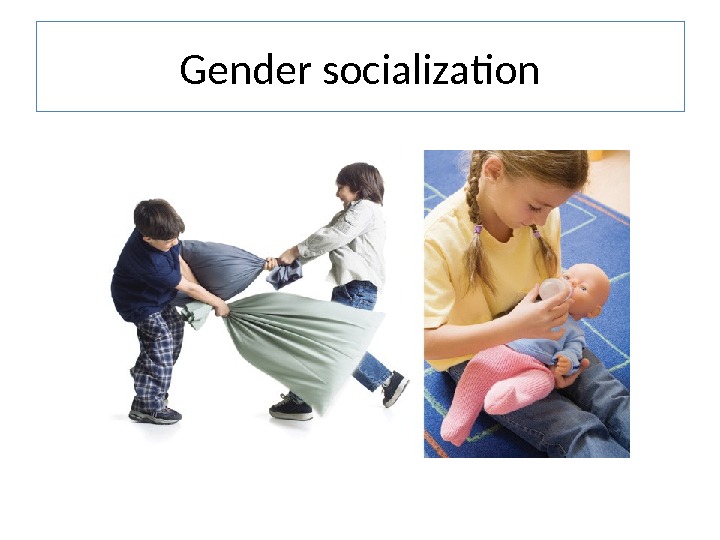
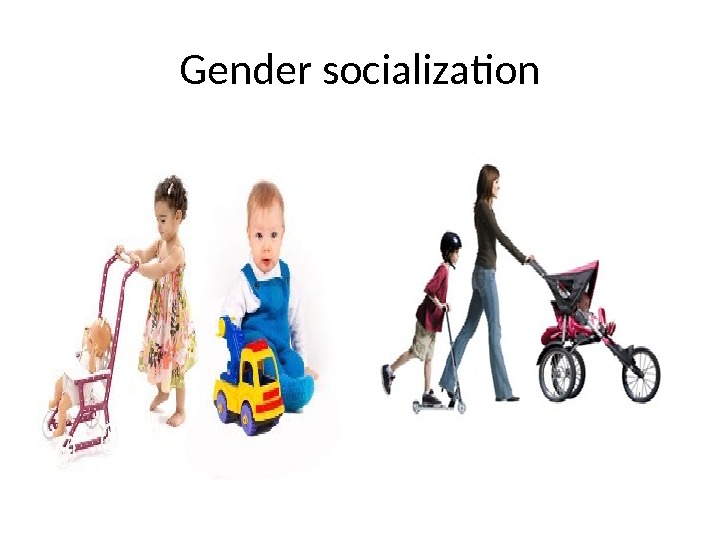
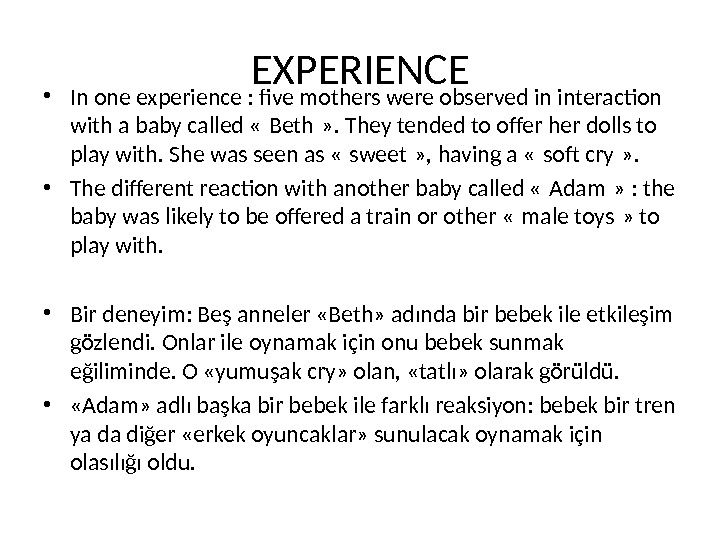
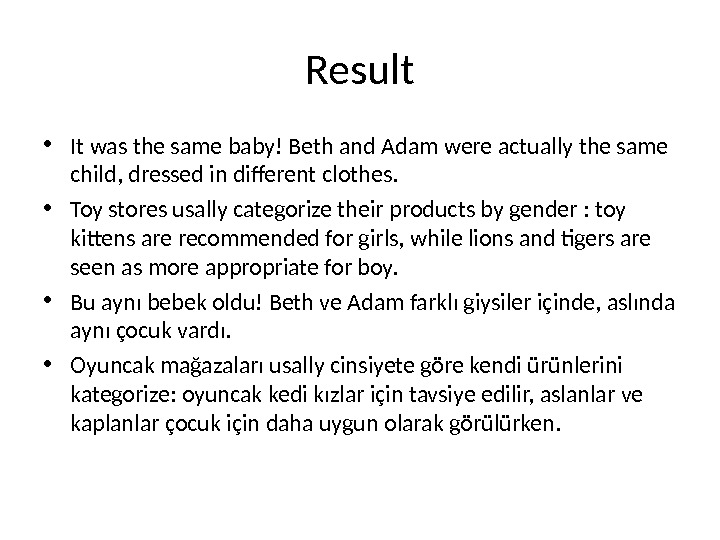
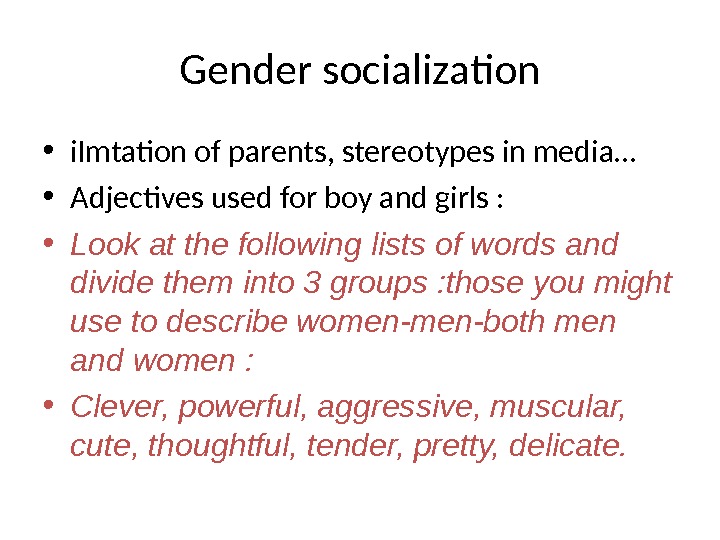
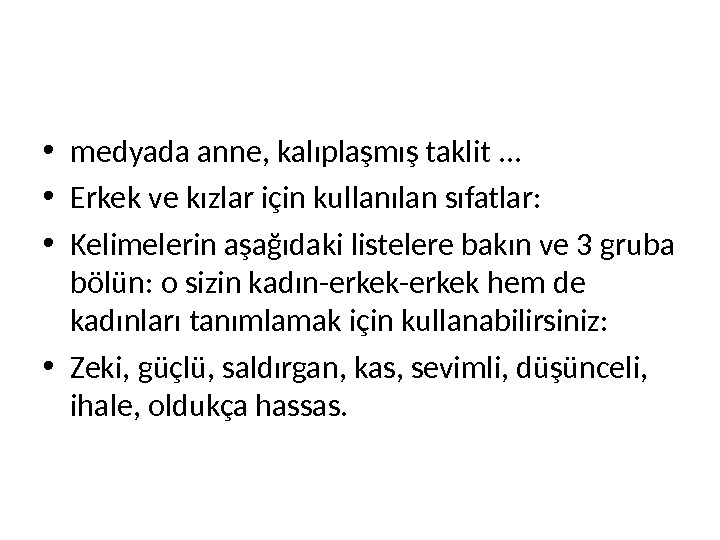
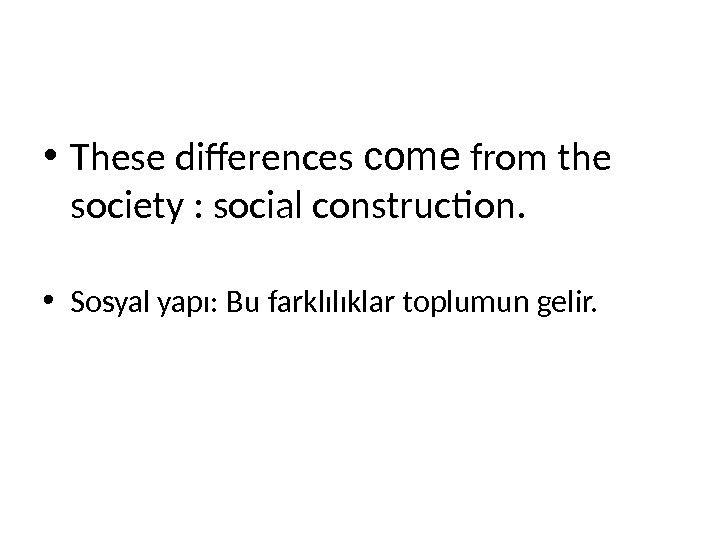
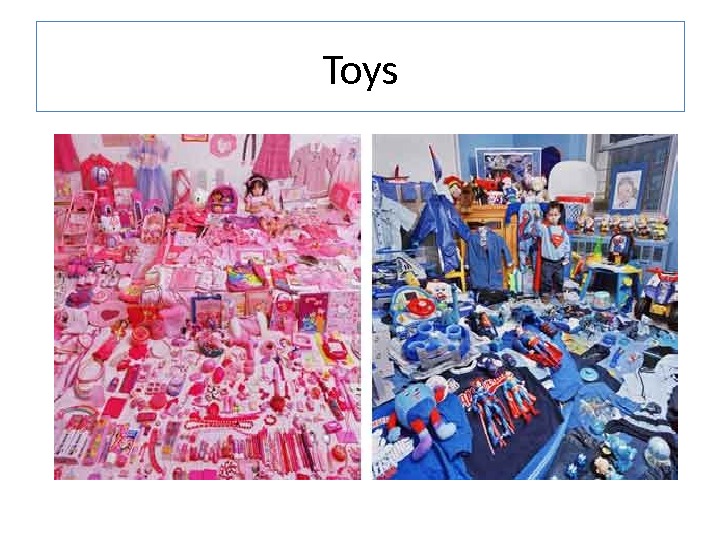
- Размер: 799.5 Кб
- Количество слайдов: 40
Описание презентации Socialization Culture • Norms : social по слайдам
 Socialization
Socialization
 Culture • Norms : social rules which define correct or appropriate behaviour in a society or group. • Values : believes about what is right or what is wrong. • Learning culture by Socialization
Culture • Norms : social rules which define correct or appropriate behaviour in a society or group. • Values : believes about what is right or what is wrong. • Learning culture by Socialization
 • Normlar: Bir toplum ya da grubun doğru veya uygun davranışı tanımlayan sosyal kurallar. • Değerler: doğru ya da neyin yanlış olduğunu ne inanmaktadır. • Toplumsallaşma tarafından kültürünü öğrenme
• Normlar: Bir toplum ya da grubun doğru veya uygun davranışı tanımlayan sosyal kurallar. • Değerler: doğru ya da neyin yanlış olduğunu ne inanmaktadır. • Toplumsallaşma tarafından kültürünü öğrenme
 Socialization • Socialization : the process of learning the culture of any society. • « Being social » / “ Being socialized” , learn the social rules, values… • Socialization is the life-long process of learning culture of any society.
Socialization • Socialization : the process of learning the culture of any society. • « Being social » / “ Being socialized” , learn the social rules, values… • Socialization is the life-long process of learning culture of any society.
 • Sosyalleşme: Herhangi bir toplumun kültürünü öğrenme süreci. • / «Toplumsallaşmış olmak», toplumsal kuralları, değerleri öğrenmek «sosyal olmak. . . » • Sosyalleşme herhangi bir toplumun kültürünü öğrenme yaşam boyu bir süreçtir.
• Sosyalleşme: Herhangi bir toplumun kültürünü öğrenme süreci. • / «Toplumsallaşmış olmak», toplumsal kuralları, değerleri öğrenmek «sosyal olmak. . . » • Sosyalleşme herhangi bir toplumun kültürünü öğrenme yaşam boyu bir süreçtir.
 Socialization Culture : refers to the language, beliefs, values, norms, knowledge and skills which combine to make up the way of life of any society. This culture is socially transmitted, it is not biological, innate, natural. =) learned =) socialization.
Socialization Culture : refers to the language, beliefs, values, norms, knowledge and skills which combine to make up the way of life of any society. This culture is socially transmitted, it is not biological, innate, natural. =) learned =) socialization.
 • Kültür: dil, inançlar, değerler, normlar, bilgi ve herhangi bir toplumun yaşam biçimini makyaj birleştirmek becerilerini ifade eder. Bu kültür, sosyal iletilir, doğal biyolojik değildir. • =) Öğrendim =) sosyalleşme.
• Kültür: dil, inançlar, değerler, normlar, bilgi ve herhangi bir toplumun yaşam biçimini makyaj birleştirmek becerilerini ifade eder. Bu kültür, sosyal iletilir, doğal biyolojik değildir. • =) Öğrendim =) sosyalleşme.
 Socialization • Socialization plays a crucial part in forming our identity : • Identity is about how we see and define ourselves — our personalities -and how other people see and define us.
Socialization • Socialization plays a crucial part in forming our identity : • Identity is about how we see and define ourselves — our personalities -and how other people see and define us.
 • Sosyalleşme bizim kimliğimizi oluşturan önemli bir rol oynar: • Bizim kişilikleri ve nasıl diğer insanlar görmek ve bizi tanımlar — Kimlik biz görmek ve kendimizi tanımlamak nasıl olduğunu.
• Sosyalleşme bizim kimliğimizi oluşturan önemli bir rol oynar: • Bizim kişilikleri ve nasıl diğer insanlar görmek ve bizi tanımlar — Kimlik biz görmek ve kendimizi tanımlamak nasıl olduğunu.
 Socialization • EX : we might define ourselves as English, a woman, a student, a father, as a Muslim… • These aspects of our individual identity are formed through the socialization process, with family, friends, school, the mass media…
Socialization • EX : we might define ourselves as English, a woman, a student, a father, as a Muslim… • These aspects of our individual identity are formed through the socialization process, with family, friends, school, the mass media…
 • EX: Biz bir Müslüman olarak, İngilizce, bir kadın, bir öğrenci, bir baba olarak kendimizi tanımlamak olabilir. . . • Bireysel kimliğin Bu açıdan aile, arkadaşlar, okul, kitle iletişim araçları ile, sosyalleşme sürecinde oluşur. . .
• EX: Biz bir Müslüman olarak, İngilizce, bir kadın, bir öğrenci, bir baba olarak kendimizi tanımlamak olabilir. . . • Bireysel kimliğin Bu açıdan aile, arkadaşlar, okul, kitle iletişim araçları ile, sosyalleşme sürecinde oluşur. . .
 Socialization 2 kinds of socialization : • Primary socialization • Secondary socialization
Socialization 2 kinds of socialization : • Primary socialization • Secondary socialization
 Primary socialization • Refers to socialization during the early years of childhood and is carried out by the family or close community. • During primary socialization : children learns about the basic values and norms, and other features of culture. • They also acquire their sense of who they are as individuals : gender, ethnicity.
Primary socialization • Refers to socialization during the early years of childhood and is carried out by the family or close community. • During primary socialization : children learns about the basic values and norms, and other features of culture. • They also acquire their sense of who they are as individuals : gender, ethnicity.
 • Çocukluğun ilk yıllarında sosyalleşme anlamına gelir ve aile veya yakın bir topluluk tarafından yürütülür. • Birincil sosyalleşme sırasında: Çocukların temel değerler ve normlar, kültür ve diğer özellikleri hakkında öğrenir. • Cinsiyet, etnik köken: onlar da birey olarak kim oldukları duygusunu kazanır.
• Çocukluğun ilk yıllarında sosyalleşme anlamına gelir ve aile veya yakın bir topluluk tarafından yürütülür. • Birincil sosyalleşme sırasında: Çocukların temel değerler ve normlar, kültür ve diğer özellikleri hakkında öğrenir. • Cinsiyet, etnik köken: onlar da birey olarak kim oldukları duygusunu kazanır.
 Hunting
Hunting
 Secondary socialization • Refers to socialization which takes place beyond the family and close community. • It is carried out through agencies of secondary socialization such as the education system, the peer group, the workplace, the mass media and religious institutions.
Secondary socialization • Refers to socialization which takes place beyond the family and close community. • It is carried out through agencies of secondary socialization such as the education system, the peer group, the workplace, the mass media and religious institutions.
 • Aile ve yakın topluluğun ötesinde gerçekleşir sosyalleşme anlamına gelir. • Bu tür eğitim sistemi, akran grubu, işyeri, kitle iletişim araçları ve dini kurumlar gibi ikincil sosyalleşme kurumları aracılığıyla gerçekleştirilir.
• Aile ve yakın topluluğun ötesinde gerçekleşir sosyalleşme anlamına gelir. • Bu tür eğitim sistemi, akran grubu, işyeri, kitle iletişim araçları ve dini kurumlar gibi ikincil sosyalleşme kurumları aracılığıyla gerçekleştirilir.

 Socialization • With socialization =) Social identity • Identity : student, mother, young adult, worker…. • « Identity » versus « Personality » : • Identity : is social; personnality : character, innate. (Ex : stubborn, selfish, touchy…)
Socialization • With socialization =) Social identity • Identity : student, mother, young adult, worker…. • « Identity » versus « Personality » : • Identity : is social; personnality : character, innate. (Ex : stubborn, selfish, touchy…)
 • Sosyalizasyon =) Sosyal kimlik ile • Kimlik: Öğrenci, anne, genç yetişkin, işçi. . • «Kimlik» «Kişilik» karşı: • Kimlik: sosyal olduğunu; personnality: karakter, doğuştan. (Ör: inatçı, bencil, alıngan. . . )
• Sosyalizasyon =) Sosyal kimlik ile • Kimlik: Öğrenci, anne, genç yetişkin, işçi. . • «Kimlik» «Kişilik» karşı: • Kimlik: sosyal olduğunu; personnality: karakter, doğuştan. (Ör: inatçı, bencil, alıngan. . . )
 Socialization • For each identity =) Social Role • Role are the patterns of behaviour which are expected from people in different positions in society. • People in society play many different roles. These roles are expected by society to behave in particular ways.
Socialization • For each identity =) Social Role • Role are the patterns of behaviour which are expected from people in different positions in society. • People in society play many different roles. These roles are expected by society to behave in particular ways.
 • Her kimlik =) Sosyal Rolü • Rol toplumda farklı pozisyonlarda insanlardan beklenen davranış kalıpları vardır. • Toplumda insanlar çok farklı roller oynarlar. Bu roller bir şekilde hareket etmek toplum tarafından beklenmektedir.
• Her kimlik =) Sosyal Rolü • Rol toplumda farklı pozisyonlarda insanlardan beklenen davranış kalıpları vardır. • Toplumda insanlar çok farklı roller oynarlar. Bu roller bir şekilde hareket etmek toplum tarafından beklenmektedir.
 Socialization IDENTITY MOTHER POLICE SOCIAL ROLES She may play the roles of woman, mother, worker, sister, wife…Look after children. He is expected to show patterns of behaviour, roles, that involve things like honesty, obeying the law.
Socialization IDENTITY MOTHER POLICE SOCIAL ROLES She may play the roles of woman, mother, worker, sister, wife…Look after children. He is expected to show patterns of behaviour, roles, that involve things like honesty, obeying the law.
 • O çocuk sonra. . . Bak kadın, anne, işçi, kız kardeşi, eşi roller oynayabilir. • O yasalara uymanın, dürüstlük gibi şeyler içeren davranış kalıplarını, rolleri göstermesi bekleniyor.
• O çocuk sonra. . . Bak kadın, anne, işçi, kız kardeşi, eşi roller oynayabilir. • O yasalara uymanın, dürüstlük gibi şeyler içeren davranış kalıplarını, rolleri göstermesi bekleniyor.
 Socialization • For each identity =) Social Roles expected • List all the roles you play, and briefly outline what others expect of you in each these roles. • Her kimlik için =) Sosyal Roller bekleniyor • Oynadığın tüm rolleri listesi ve kısaca her bu rolleri sizden bekledikleri diğerleri anahat.
Socialization • For each identity =) Social Roles expected • List all the roles you play, and briefly outline what others expect of you in each these roles. • Her kimlik için =) Sosyal Roller bekleniyor • Oynadığın tüm rolleri listesi ve kısaca her bu rolleri sizden bekledikleri diğerleri anahat.
 Norms • Roles = related to norms • Norms are social rules which define correct and acceptable behaviour in a society or social group to which people are expected to conform. • Mother who doesn’t look after her children =) abnormal. • Normlara ilişkin roller = • Normlar insanların uyması beklenir hangi bir toplumun ya da sosyal gruba doğru ve kabul edilebilir davranışları tanımlayan toplumsal kurallar vardır. • Anne kim anormal) = çocuklarıyla sonra görünmüyor.
Norms • Roles = related to norms • Norms are social rules which define correct and acceptable behaviour in a society or social group to which people are expected to conform. • Mother who doesn’t look after her children =) abnormal. • Normlara ilişkin roller = • Normlar insanların uyması beklenir hangi bir toplumun ya da sosyal gruba doğru ve kabul edilebilir davranışları tanımlayan toplumsal kurallar vardır. • Anne kim anormal) = çocuklarıyla sonra görünmüyor.
 Norms • Jump queues in supermarkets, • laugh during funerals, • never say « hello » to friends : =) seen as annoying , rude or odd because they are not following the norms of accepted behaviour. • Süpermarketlerde kuyruklar atlamak, • cenaze sırasında gülmek, • arkadaşlar «merhaba» never say: • Onlar kabul davranış normları aşağıdaki değildir çünkü =), rahatsız edici kaba ya da tek olarak görülüyor.
Norms • Jump queues in supermarkets, • laugh during funerals, • never say « hello » to friends : =) seen as annoying , rude or odd because they are not following the norms of accepted behaviour. • Süpermarketlerde kuyruklar atlamak, • cenaze sırasında gülmek, • arkadaşlar «merhaba» never say: • Onlar kabul davranış normları aşağıdaki değildir çünkü =), rahatsız edici kaba ya da tek olarak görülüyor.
 Agencies of socialization
Agencies of socialization
 Agencies of socialization • School : learning the social rules. • Children are expected to be quiet, be punctual at lessons and observe rules of school discipline. • Okul: Sosyal kurallarını öğrenme. • Çocuklar sessiz olması bekleniyor, derslerinde dakik olmak ve okul disiplin kurallarına uymak
Agencies of socialization • School : learning the social rules. • Children are expected to be quiet, be punctual at lessons and observe rules of school discipline. • Okul: Sosyal kurallarını öğrenme. • Çocuklar sessiz olması bekleniyor, derslerinde dakik olmak ve okul disiplin kurallarına uymak
 Agencies of socialization • Mass Media : radio, television, internet, records, videos =) influence opinions, attitudes and behaviour. • The media plays a large role in shaping our understanding of the world and therefore in socialization. • Kitle Medya: Radyo, televizyon, internet, kayıtlar, videolar =) görüşler, tutum ve davranışlarını etkilemektedir. • Medya dünya anlayışımızı şekillendiren ve bu nedenle sosyalleşme büyük bir rol oynar.
Agencies of socialization • Mass Media : radio, television, internet, records, videos =) influence opinions, attitudes and behaviour. • The media plays a large role in shaping our understanding of the world and therefore in socialization. • Kitle Medya: Radyo, televizyon, internet, kayıtlar, videolar =) görüşler, tutum ve davranışlarını etkilemektedir. • Medya dünya anlayışımızı şekillendiren ve bu nedenle sosyalleşme büyük bir rol oynar.
 Gender socialization • Agencies of socialization play an important role in how children learn gender roles. • Gender : the state of being male or female. The state in which someone comes to say “I am a man” or “I am a woman”. • By socialization : individuals learn how to be and to act as a woman/ man. • Children learn to act by imitation : the action of using someone or something as a model.
Gender socialization • Agencies of socialization play an important role in how children learn gender roles. • Gender : the state of being male or female. The state in which someone comes to say “I am a man” or “I am a woman”. • By socialization : individuals learn how to be and to act as a woman/ man. • Children learn to act by imitation : the action of using someone or something as a model.
 • Sosyalleşme Ajanslar çocukların cinsiyet rollerini öğrenmek ne kadar önemli bir rol oynamaktadır. • Cinsiyet: erkek ya da kadın olma durumu. Birisi «Ben bir erkeğim» veya «ben bir kadınım» demek için çıktığı, devlet. • Sosyalleşme: bireyler olmak ve bir kadın / erkek gibi hareket etmeyi öğrenmesi. • Çocuklar taklit ile hareket öğrenmek: Bir model olarak birini veya bir şeyi kullanarak eylem
• Sosyalleşme Ajanslar çocukların cinsiyet rollerini öğrenmek ne kadar önemli bir rol oynamaktadır. • Cinsiyet: erkek ya da kadın olma durumu. Birisi «Ben bir erkeğim» veya «ben bir kadınım» demek için çıktığı, devlet. • Sosyalleşme: bireyler olmak ve bir kadın / erkek gibi hareket etmeyi öğrenmesi. • Çocuklar taklit ile hareket öğrenmek: Bir model olarak birini veya bir şeyi kullanarak eylem
 Gender socialization
Gender socialization
 Gender socialization
Gender socialization
 EXPERIENCE • In one experience : five mothers were observed in interaction with a baby called « Beth » . They tended to offer her dolls to play with. She was seen as « sweet » , having a « soft cry » . • The different reaction with another baby called « Adam » : the baby was likely to be offered a train or other « male toys » to play with. • Bir deneyim: Beş anneler «Beth» adında bir bebek ile etkileşim gözlendi. Onlar ile oynamak için onu bebek sunmak eğiliminde. O «yumuşak cry» olan, «tatlı» olarak görüldü. • «Adam» adlı başka bir bebek ile farklı reaksiyon: bebek bir tren ya da diğer «erkek oyuncaklar» sunulacak oynamak için olasılığı oldu.
EXPERIENCE • In one experience : five mothers were observed in interaction with a baby called « Beth » . They tended to offer her dolls to play with. She was seen as « sweet » , having a « soft cry » . • The different reaction with another baby called « Adam » : the baby was likely to be offered a train or other « male toys » to play with. • Bir deneyim: Beş anneler «Beth» adında bir bebek ile etkileşim gözlendi. Onlar ile oynamak için onu bebek sunmak eğiliminde. O «yumuşak cry» olan, «tatlı» olarak görüldü. • «Adam» adlı başka bir bebek ile farklı reaksiyon: bebek bir tren ya da diğer «erkek oyuncaklar» sunulacak oynamak için olasılığı oldu.
 Result • It was the same baby! Beth and Adam were actually the same child, dressed in different clothes. • Toy stores usally categorize their products by gender : toy kittens are recommended for girls, while lions and tigers are seen as more appropriate for boy. • Bu aynı bebek oldu! Beth ve Adam farklı giysiler içinde, aslında aynı çocuk vardı. • Oyuncak mağazaları usally cinsiyete göre kendi ürünlerini kategorize: oyuncak kedi kızlar için tavsiye edilir, aslanlar ve kaplanlar çocuk için daha uygun olarak görülürken.
Result • It was the same baby! Beth and Adam were actually the same child, dressed in different clothes. • Toy stores usally categorize their products by gender : toy kittens are recommended for girls, while lions and tigers are seen as more appropriate for boy. • Bu aynı bebek oldu! Beth ve Adam farklı giysiler içinde, aslında aynı çocuk vardı. • Oyuncak mağazaları usally cinsiyete göre kendi ürünlerini kategorize: oyuncak kedi kızlar için tavsiye edilir, aslanlar ve kaplanlar çocuk için daha uygun olarak görülürken.
 Gender socialization • i. Imtation of parents, stereotypes in media… • Adjectives used for boy and girls : • Look at the following lists of words and divide them into 3 groups : those you might use to describe women-both men and women : • Clever, powerful, aggressive, muscular, cute, thoughtful, tender, pretty, delicate.
Gender socialization • i. Imtation of parents, stereotypes in media… • Adjectives used for boy and girls : • Look at the following lists of words and divide them into 3 groups : those you might use to describe women-both men and women : • Clever, powerful, aggressive, muscular, cute, thoughtful, tender, pretty, delicate.
 • medyada anne, kalıplaşmış taklit. . . • Erkek ve kızlar için kullanılan sıfatlar: • Kelimelerin aşağıdaki listelere bakın ve 3 gruba bölün: o sizin kadın-erkek hem de kadınları tanımlamak için kullanabilirsiniz: • Zeki, güçlü, saldırgan, kas, sevimli, düşünceli, ihale, oldukça hassas.
• medyada anne, kalıplaşmış taklit. . . • Erkek ve kızlar için kullanılan sıfatlar: • Kelimelerin aşağıdaki listelere bakın ve 3 gruba bölün: o sizin kadın-erkek hem de kadınları tanımlamak için kullanabilirsiniz: • Zeki, güçlü, saldırgan, kas, sevimli, düşünceli, ihale, oldukça hassas.
 • These differences come from the society : social construction. • Sosyal yapı: Bu farklılıklar toplumun gelir.
• These differences come from the society : social construction. • Sosyal yapı: Bu farklılıklar toplumun gelir.
 Toys
Toys

